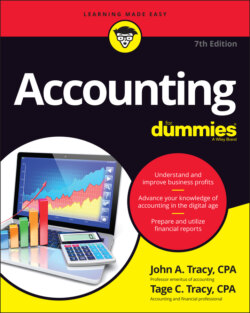Читать книгу Accounting For Dummies - John A. Tracy - Страница 17
Recognizing users of accounting information
ОглавлениеPeople who use accounting information fall into two broad groups: insiders (internal users) and outsiders (external users).
Business managers are insiders; they have the authority and responsibility to run a business. They need a good understanding of accounting terms and the methods used to measure profit and put values on assets and liabilities. Accounting information is indispensable for planning and controlling the financial performance and condition of the business. Likewise, administrators of NFP and governmental entities need to understand the accounting terminology and measurement methods in their financial statements.
The rest of us are outsiders. We aren’t privy to the day-to-day details of a business or organization. We have to rely on financial reports from the entity to know what’s going on. Therefore, we need to have a good grip on the financial statements included in the financial reports. For all practical purposes, financial reports are the only source of financial information we get directly from a business or other organization.
By the way, the employees of a business — even though they obviously have a stake in the success of the business — don’t necessarily receive its financial reports. Only the investors in the business and its lenders are entitled to receive the financial reports. Of course, a business could provide this information to employees who aren’t shareowners, but generally speaking, most businesses do not. The financial reports of public businesses are in the public domain, so their employees can easily secure a copy. However, most businesses don’t automatically mail financial reports to all employees.
In your personal financial life, a little accounting knowledge is a big help for understanding investing in general, how investment performance is measured, and many other important financial topics. With some basic accounting knowledge, you’ll sound much more sophisticated when speaking with your banker or broker. We can’t promise you that learning accounting will save you big bucks on your income taxes, but it can’t hurt and will definitely help you understand what your tax preparer is talking about.
This is not a book on bookkeeping and recordkeeping systems. We offer a brief explanation of procedures for capturing, processing, and storing accounting information in Chapter 3. Even experienced bookkeepers and accountants should find some useful nuggets in that chapter. However, this book is directed to users of accounting information. We focus on the end products of accounting, particularly financial statements, and not on how information is accumulated. When buying a new car, you’re interested in the finished product, not details of the manufacturing process that produced it.
